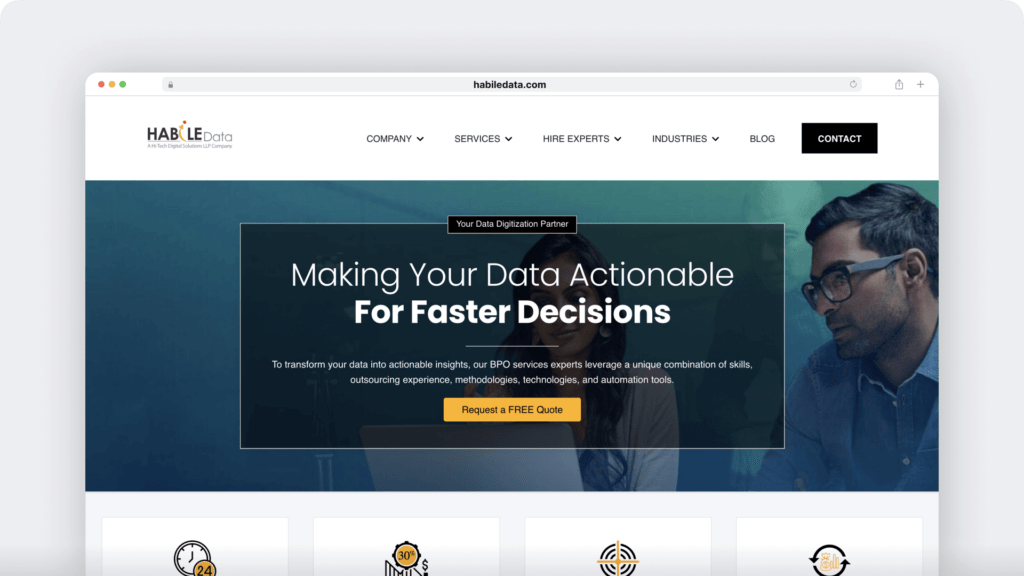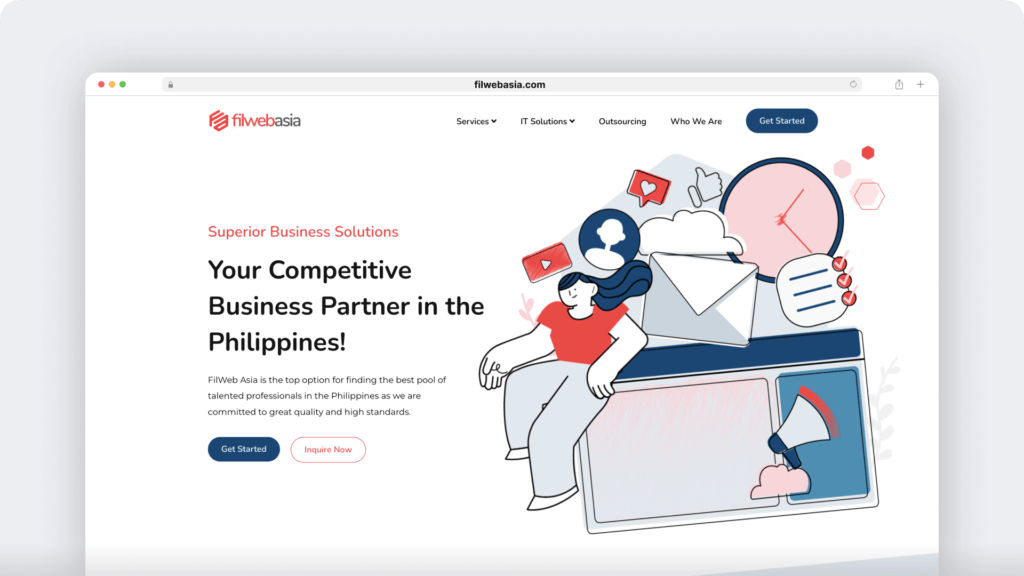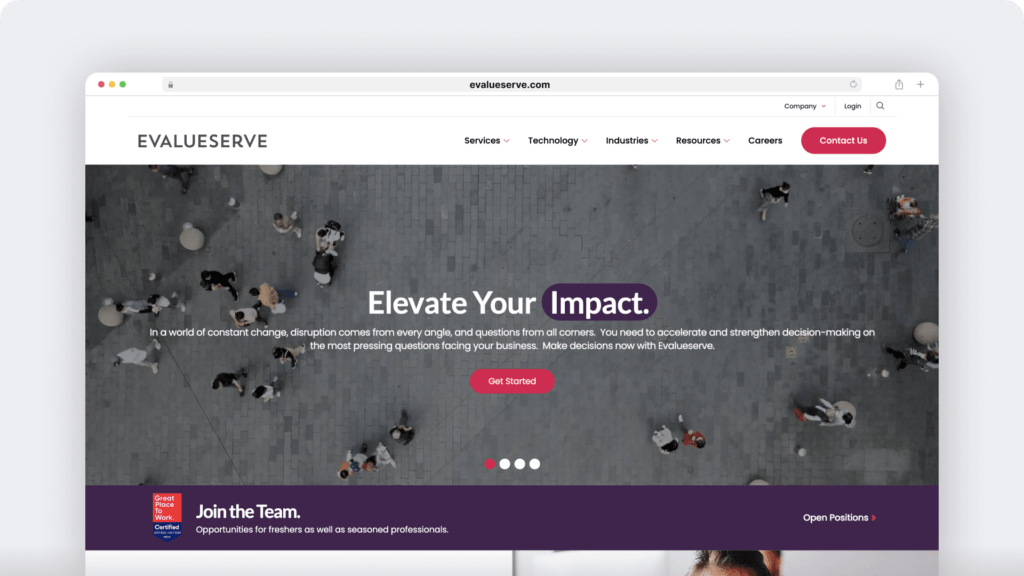Organizations opt for Knowledge Process Outsourcing (KPO) services when their in-house team doesn’t have adequate expertise to handle certain high-level tasks.
Firms offering KPO services can help you with data analytics, market research, performance management, and much more. This way, you acquire valuable knowledge to make data-driven decisions and strategize better for maximum success.
In this article, we’ll discuss what Knowledge Process Outsourcing (KPO) is and the 12 types of KPO services. We’ll also highlight three major differences between KPO and BPO.
Finally, we’ll examine some common examples, pros, and cons of KPO and discover three leading service providers in the KPO industry.
Table of Contents
- What are KPO services?
- 12 common types of KPO services
- KPO vs. BPO: 3 key differences
- 3 common examples of KPO services
- 4 significant benefits of KPO services
- 3 primary challenges of KPO services
- Top 3 KPO service providers
Let’s get started.
What are KPO services?
Knowledge Process Outsourcing is contracting information-related business activities to an external organization or a third-party service provider. This KPO firm can be in the same city as your company or a different geographic location within the country.
KPO services usually involve collecting, storing, and analyzing a high volume of critical company data.
It provides companies additional support in accounting, healthcare, information technology, software development, engineering, and more. And KPO services are offered by a staff with expertise in niche or complex business functions.
By outsourcing knowledge processes and analytical tasks, companies can get an expert opinion and objective insights into their business operations.
Say a law firm decides to partner with a legal process outsourcing firm. This KPO company can help them with IP and governance, litigation support, compliance, risk management, and other legal matters that the in-house team may not be well-equipped to handle.
So knowledge process outsourcing can help companies identify new growth opportunities, retain high-end clients, and run smooth operations.
Why do organizations need KPO services?
Here are a few reasons why organizations across various industry verticals opt for KPO services:
- A lack of technical skill and subject matter experts within the company.
- To fulfill one-time tasks that don’t require hiring a permanent employee.
- To obtain a highly skilled workforce at a lower cost.
- To improve service or product quality and business process efficiency.
- To stay ahead of competitors by leveraging advanced technologies and employee expertise.
So what are the different KPO services organizations can benefit from?
Let’s find out.
12 common types of KPO services
Here are the different types of services offered by the KPO sector:
- Market research: Offers business research data on emerging markets, consumer behavior, demographic interests, consumer trends, etc.
- Financial research: Helps commercial banks, investment bankers, stock brokers, etc. improve cash flow with asset management support.
- Business management consulting: Analyzes new market opportunities, customer expectations, and helps organizations with long-term goals.
- Technical analysis: Uses sophisticated technologies like AI, automation, and data analytics to speed up and streamline business workflow.
- Legal research: Examines laws (pertaining to litigation or non-litigation areas), determines contract compliance, liabilities, etc.
- Human resources research: Offers latest reports and data on best hiring practices, human resource management, global recruiting trends, and more.
- Medical and healthcare research: Collects surveys and trial results to help organizations develop new medicines and medical procedures.
- Data analysis and management: Uses big data to uncover actionable insights and implements machine learning to build advanced work models.
- Intellectual Property (IP) research: Enables clients to actively manage and protect the credit for their inventions with copyrights, trade secrets, and patents.
- Customer service and call centers: Provides in-depth reports on customer service trends and statistics to increase customer retention.
- Utility management: Prepares budgets, reports, and optimizes energy (water, electricity, etc.) spendings in your company through granular, real-time data.
- Content development: Offers content writing services (blogs, social media posts, infographics, newsletters, etc.) relevant to your target audience and brand’s tone of voice.
Next up, we’ll find out the primary differences between business process outsourcing and knowledge process outsourcing.
KPO vs. BPO: 3 key differences
While business process outsourcing (BPO) involves the outsourcing of non-core business operations, KPO provides specialized knowledge and data analysis on complex functions. So, KPO can be considered a subset of BPO.
Here’s a comparison table for your better understanding:
| KPO | BPO | |
| Methodology | KPO entails outsourcing of core, high-level tasks requiring adequate knowledge and business acumen. The employees generally provide insights or predict business outcomes based on their judgment and data analysis. | BPO services focus on low-level business processes and peripheral activities of the organization. The outsourcing team usually follows pre-defined rules and methods during the execution of the BPO service. |
| Required Expertise | Highly skilled employees with superior problem-solving, analytical, and technical skills. | Staff with basic qualifications possessing good communication skills. |
| Task Complexity | Involves advanced, knowledge-based tasks like business research, human resource management, investment research, legal services, engineering services, financial services, etc. | Involves relatively easy tasks related to back office functions, data entry, customer support, accounting, transcription, website services, payroll processing, etc. |
Check out this comprehensive guide to BPO, including seven key trends that will matter in 2024.
Now let’s explore some examples of knowledge process outsourcing services.
3 common examples of KPO services
Here are three instances from different industries choosing KPO services:
1. Manufacturing industry
Manufacturing industries often use KPO services for supply chain management. The KPO firm leverages analytics in which they analyze data to enable a business to predict future demand for raw materials better. The service providers help an organization understand customer needs after the initial order and decide which products can be minimized.
2. Food and beverage industry
Food and beverage industries benefit from toxicology consulting services offered by a KPO company. The service provider can test the ingredients used in a particular product through hazard screening and risk analysis. The results of these tests can be compiled in the form of reports for submission to regulatory agencies that approve the final product.
3. B2B industry
B2B businesses can outsource web research services to gather information on various businesses in their database. The KPO company can conduct meticulous research to collect data and prepare the contact list. This way, the B2B business can access the updated information of the key contact persons, including their designation, employment history, location, emails, etc.
B2B businesses aiming to build a B2B marketplace can outsource web research services to gather detailed information on businesses, ensuring they have essential data for effective marketplace operations.
Let’s explore the several advantages of using KPO solutions for your business.
4 significant benefits of KPO services
Here’s how organizations can benefit by including a KPO process in their business strategy:
1. Reduce operational costs
The average salary in leading outsourcing destinations like India and the Philippines is less than those in Europe and North America. By outsourcing knowledge-based business activities to a KPO firm, western companies can cut back on employee hiring and training costs.
Moreover, the KPO staff you work with are primarily contractual employees. So you won’t have to provide additional salary benefits for transportation, medical, etc.
And since you’ll be dealing with outsourced employees remotely, your organizations can save a substantial amount on office equipment, hardware maintenance, and more.
In fact, as per Deloitte’s 2020 Global Outsourcing Survey Report, cost reduction is one of the major reasons for organizations to turn to outsourcing.
2. Optimize core business processes
By outsourcing complex tasks to a third-party service provider, companies can elevate their core business processes or even customer care strategy. This allows in-house employees to look into other important aspects of your business.
Let’s say you’re a law firm that decides to go for legal process outsourcing services. The outsourcing team can provide specialized knowledge on federal laws, compliance laws, arbitration letters, deposition summaries, and so on.
On the other hand, your internal legal team can conduct client research, handle legal disputes, negotiate settlement terms, and help you retain high-end clients.
So knowledge process outsourcing can help you focus on your core competency and improve the business process efficiency.
3. Improve performance in non-core areas
As outsourcing firms aim to fulfill their clients’ complex business requirements, they always hire competent employees with impressive qualifications. The outsourcing team’s technological know-how helps them deliver the best results for your support processes like information technology, marketing, human resources, etc.
Delegating such ancillary tasks to your in-house team may help you get things done internally under your direct supervision. But if you’re understaffed and your employees are overworked, it may reduce the overall organizational performance.
Instead, you can recruit a team in a KPO company specializing in these support services. This way, your work quality is never compromised.
4. Access to advanced technology
Most firms in the KPO sector deploy innovative technologies to help businesses with their complex processes in the shortest possible time.
According to the 2022 Statista survey, 64% of respondents believe that data and analytics improve workplace efficiency and productivity.
For example, when you outsource call center services to a firm, they can harness your customer data to provide a complete picture. Through advanced analytics and AI-powered tools, they can help you evaluate customer lifetime value, churn rate, loyalty, VoC (Voice of Customer), and more.
Based on the research and insights, you can optimize your customer care strategies.
However, there are certain disadvantages that you need to consider before taking the final call.
3 primary challenges of KPO services
Here are a few limitations of knowledge processing outsourcing that you should consider before partnering with a KPO company:
1. Risks of intellectual property theft
Before tying up with KPO providers, you should ensure that the outsourcing agreement specifies ownership of intellectual property rights.
Intellectual property theft is a common problem in the KPO sector. It happens when the service provider has access to your technical know-how or other confidential information. The data is always at the risk of being stolen, sold, or even misplaced in the process of working with an outside vendor.
You can avoid this problem by drawing up an NNN (Non-Disclosure, Non-Use, and Non-Circumvention) agreement. It will prevent your outsourced employees from disclosing, using, or selling your trade secrets.
2. Miscommunication and language barrier
Your outsourcing team in Asian countries may not be that fluent in English. It may make it difficult for them to understand the complex requirements of the task, leading to mistakes or subpar work quality.
Ideally, you’ll need to hire a proficient translator or have a few bilingual speakers in your outsourcing team to mitigate the risks.
3. Employee monitoring issues
Analyzing your employee’s work efficiency isn’t easy, especially when they are working remotely from a different geographic location.
After all, you’ll have no idea how many hours they put in each day or how long they take to wrap up particular tasks?
Fortunately, you can use the robust time tracking tool Time Doctor to reduce employee distractions and monitor their productivity levels.
Using this employee management software, you can gain clear insights into your outsourcing team’s performance.
Here are a few outstanding features of Time Doctor:
- Track your remote employees’ work hours with the silent and interactive time tracking features.
- Reduce inactivity and help the team stay focused by sending idle time pop-up alerts.
- Generate productivity reports to get hourly, daily, and weekly time data.
- Assign tasks and projects to the team to help them stay on top of priority tasks.
- Distribute workload fairly and set up work schedules for every employee.
- Automatically approve employee timesheets and make batch payments with payroll integration.
Now let’s find out the top KPO providers making a mark in the KPO sector.
Top 3 KPO service providers
Let’s go over a few of the popular KPO firms in the world:
1. HabileData

HabileData is an India-based business process outsourcing company offering high-quality knowledge services like data processing, data management, catalog management, etc. Their clients are largely from Latin American and European countries across the industries of travel, hospitality, healthcare, and real estate.
Key services
- Offers consulting expertise to B2B companies to lower the cost per customer acquisition and add profitable customers to the database.
- Provides real estate photo editing services to enhance the look of properties and improve customer engagement levels.
- Helps clients create page layout design for books and periodicals along with typesetting and formatting.
- Assists with cost-effective end to end data cleansing services to improve your data quality and make it error-free.
2. FilWeb Asia, Inc.

FilWeb Asia, Inc. is a KPO firm headquartered in the Philippines, offering cost-effective pricing options for their KPO services. It specializes in back office functions, customer support, web development, and other outsourcing services.
Key services
- Offers inbound call center services, including call overflow, inquiry handling, issue resolution, order management and processing, etc.
- Helps with 24X7 technical support through state-of-the-art systems, equipment, and latest technologies.
- Provides search engine marketing services to boost your website’s online presence, increase traffic, and convert more leads.
- Hires skilful project coordinators to assist you with your writing related work and research processes in a particular field.
3. Evalueserve

Evalueserve is a leading outsourcing service provider offering solutions for data analytics, investment research, legal process, supply chain, and more. This KPO company is headquartered in Switzerland and has multiple branches in Chile, China, India, the USA, and the Netherlands.
Key services
- Helps you understand which variables impact your business and which competitors to be wary of, through business strategy and planning services.
- Offers data engineering services with AI and advanced analytics to capture more value and drive real-time decisions.
- Develops meaningful customer segments to support targeted campaigns under marketing and sales enablement services.
- Provides expert financial service through agile risk technology, analytics, and domain expertise.
Final thoughts
Many organizations worldwide choose KPO services to benefit from a highly skilled workforce and innovative IT solutions.
However, you’ll need to consider your existing work model, long-term goals, and other business expectations before partnering with any firm in the KPO industry.
Read through this article to understand the pros and cons of KPO and how it differs from business process outsourcing to make the best decision for your business.

Liam Martin is a serial entrepreneur, co-founder of Time Doctor, Staff.com, and the Running Remote Conference, and author of the Wall Street Journal bestseller, “Running Remote.” He advocates for remote work and helps businesses optimize their remote teams.


